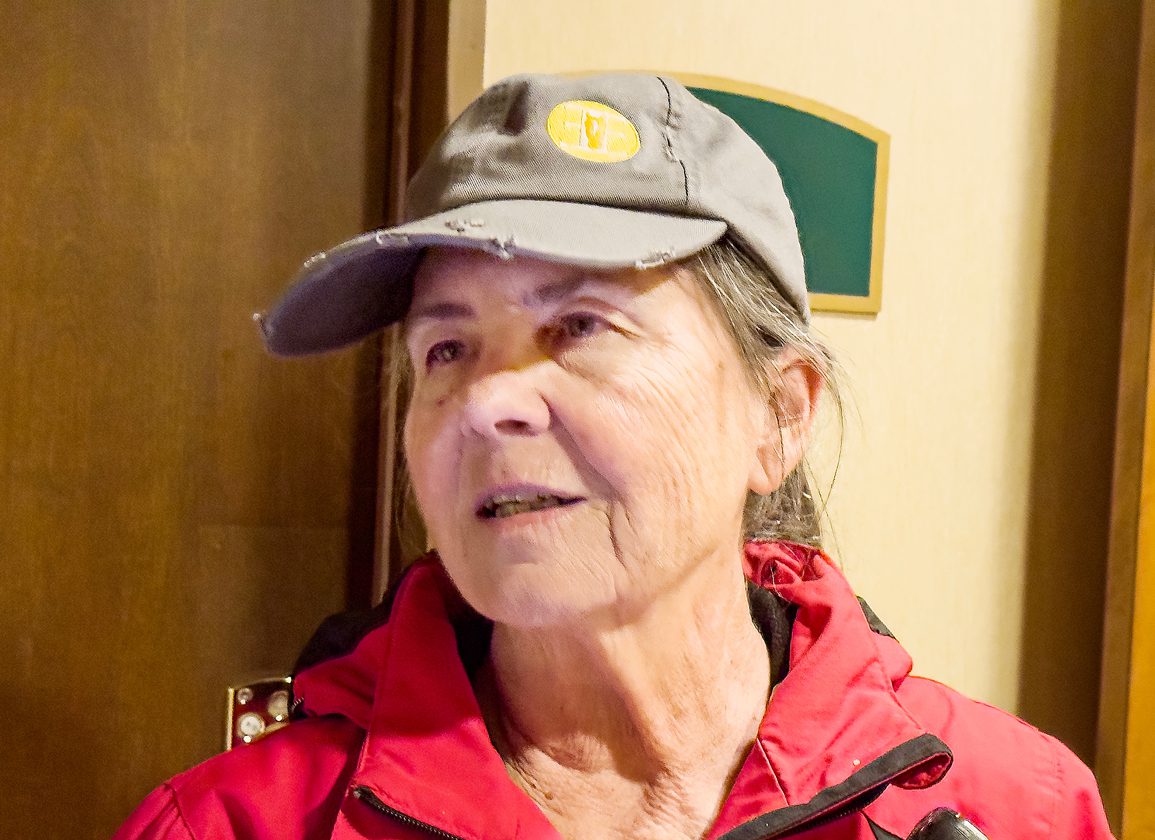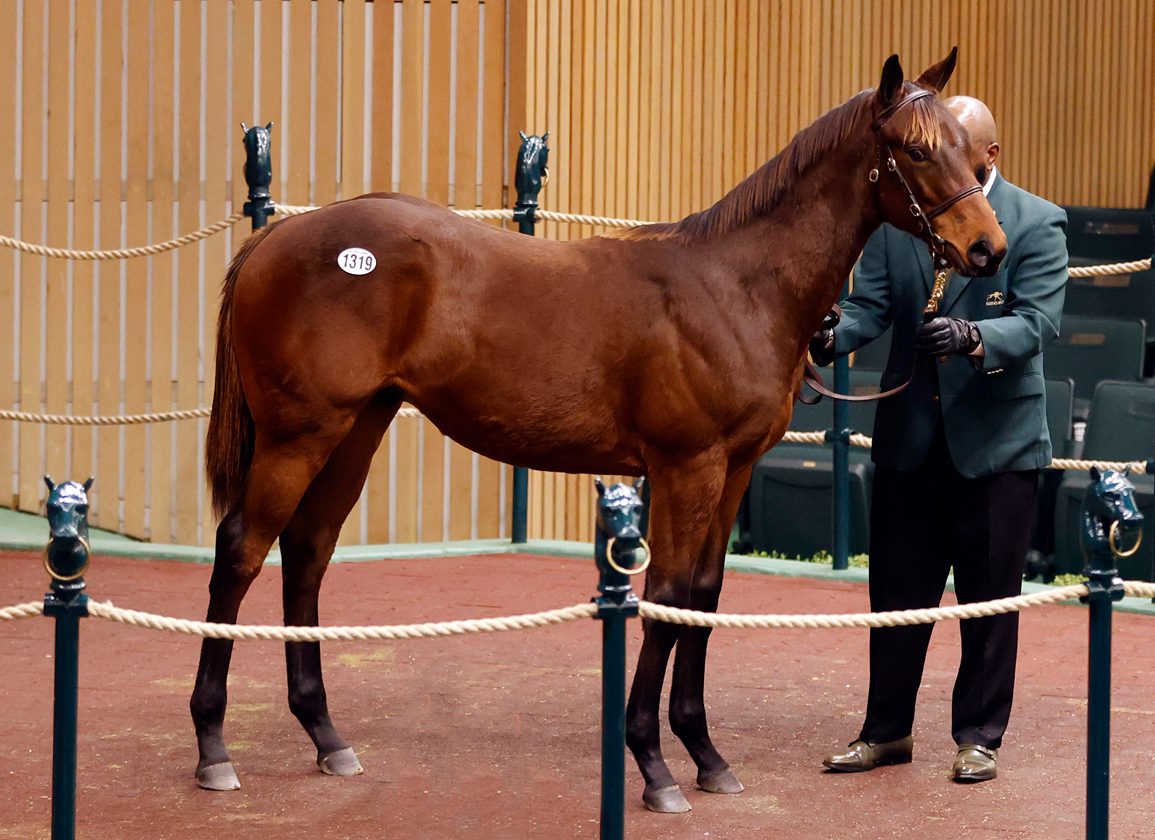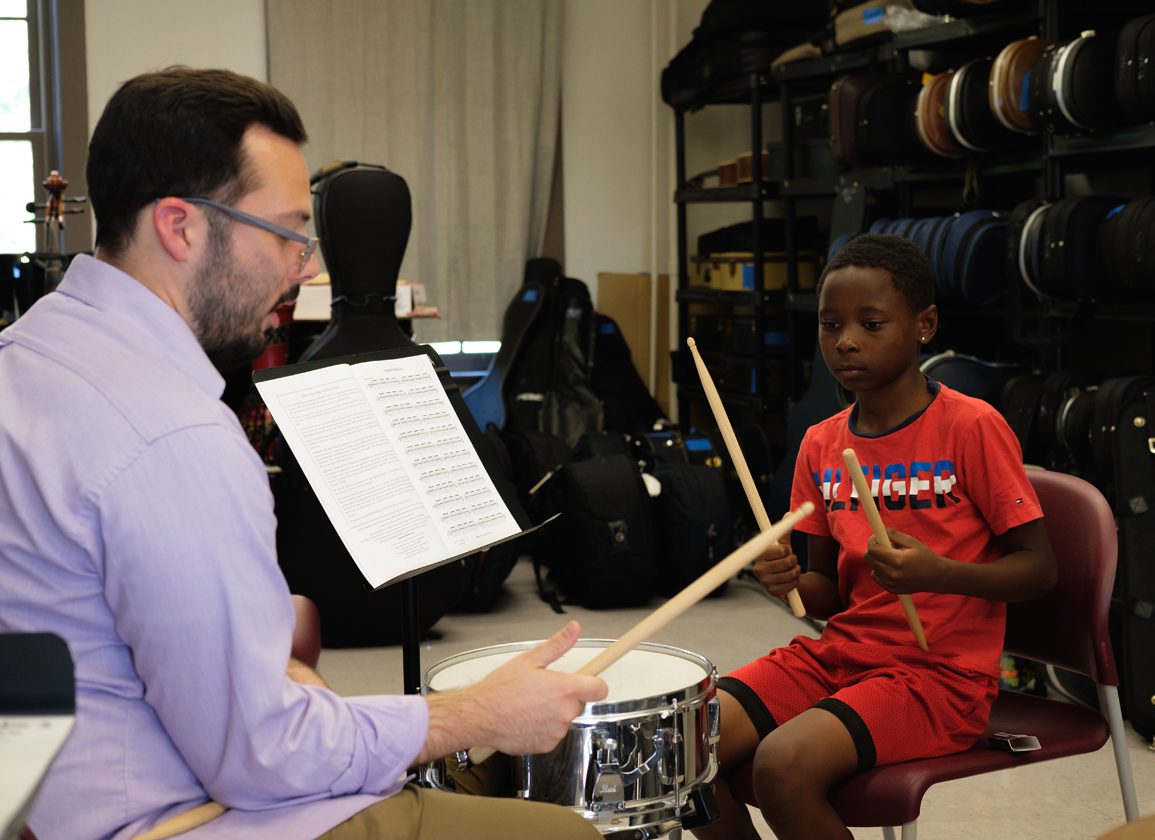LEXINGTON, KY – The Keeneland November Breeding Stock Sale entered its Book 3 section Saturday in Lexington. Leading the day's trade was the 4-year-old broodmare Chameleon (Candy Ride {Arg}), who sold for $425,000 to the bid of Terri Burch of Stoneway Farm. The mare, in foal to Practical Joke, was bred and consigned by Mt. Brilliant Farm.
During the session, 243 horses grossed $15,012,500 for an average of $61,780 and a median of $50,000. The average was down 27% from last year's opening Book 3 session and the median was lower by 23.08%. With 80 horses reported as not sold, the buy-back rate was 24.77%. It was 26.63% a year ago.
There were just six horses to sell for $200,000 or over Saturday at Keeneland, compared to 16 a year ago.
“It shows how polarized our sales are right now because I came over here today and RNA'd them for $20,000 and then we sold one for $290,000,” said Tommy Eastham, whose Legacy Bloodstock offered two of the horses to reach $200,000 on the day. “The market is good, but it's really selective. It's very polarized. It just makes us better horsemen. We need to be better consignors, take better care of our horses because little penalties that you used to be able to get away with, that were maybe 20% penalty in the past, are fatal for your sale now. I hope it gets a little better and spreads out a little bit, but if you tick all the proverbial boxes, it's still really good.”
Weanlings from the first crop of Yaupon have been in demand all week and two colts by the Spendthrift stallion led the foals Saturday, selling for $220,000 to Brownsboro Racing and for $205,000 to Peter O'Callaghan's Cavalier Bloodstock.
While the weanling market has been competitive all week at Keeneland, O'Callaghan said he has noticed a drop-off in quality from years past.
“Unfortunately, the quality is not here,” O'Callaghan said. “We used to have a big list of horses in Book 3 at Keeneland November every year, but we are in single digits this year. There are not as many people offering the good weanlings as there used to be.”
O'Callaghan continued, “It's clear they are holding on to them. But if you're smart, selling the weanlings is a smart business. There are a lot of end-users here, the competition is not nearly as strong as the yearling market and the vetting–there is no comparison to how stringent it is at the yearling sales. I'm starting to think I should start selling a few myself. It's been a hot trade for the quality, there's just not enough quality here.”
The Keeneland November sale continues through Nov. 16 with sessions beginning daily at 10 a.m.
Chameleon to Stoneway Farm
Chameleon (Candy Ride {Arg}) (hip 1437) will be joining the broodmare band at Jim Stone's Stoneway Farm after selling for a session-topping $425,000 Saturday at Keeneland. The 4-year-old mare, bred and consigned by Mt. Brilliant Farm, sold in foal to Practical Joke.
“She's a very attractive mare in foal to Practical Joke who just had two double raises in his stud fee,” Stoneway's Terri Burch said after signing the ticket on the mare. “We are looking for big, attractive mares. We lost one of ours this year that was in foal to Jack Christopher, so we were looking to find something to replace her.”
Home to some 15 mares, Stoneway lost the mare Ahh (Saint Liam), dam of multiple graded winner Ahh Chocolate (Candy Ride {Arg}), this year.
“We have a lot of that family, so we were looking for something in a family we didn't have with a lot of winners and stakes horses in it,” Burch said.
Chameleon is a daughter of stakes winner Secret Someone (A.P. Indy). Her granddam is Private Gift (Unbridled), who produced multiple graded winner Private Mission, as well as the dam of Grade I winner Dunbar Road.
Stoneway Farm campaigned multiple graded winner Stonetastic (Mizzen Mast), who the operation purchased for $77,000 at the 2012 Keeneland September sale. The gray mare joined the farm's broodmare band and her filly by Gun Runner sold for $925,000 at last year's Keeneland September sale.
“It's so much cheaper for us to race one of our own and make it a stakes horse then try to come over and buy one,” Burch said. “We've been very successful buying them on the cheap and they turn into graded stakes horses and we bring them home to the farm. So we are hoping we get great babies out of [Chameleon] because she's so beautiful.”
Yaupon Weanlings in Demand
Weanlings from the first crop of Grade I winner Yaupon (Uncle Mo) have sold well all week at Keeneland, with 20 sold through four sessions for an average of $164,500 and three selling for $400,000 or over.
The top two weanlings to sell during Saturday's session of the auction were colts by the Spendthrift stallion, with Peter O'Callaghan's Cavalier Bloodstock going to $205,000 to acquire hip 1319 from the Grovendale Sales consignment, and hip 1430, from the Legacy Bloodstock consignment, selling for $220,000 to the phone bid of Brownsboro Racing.
“He's a very good-looking horse himself,” O'Callaghan said of Yaupon. “He's out of a Vindication mare, so that's a great influence and it must be coming through, between the Uncle Mo, [Uncle Mo's sire] Indian Charlie, and the Vindication–all of the above. I think he's really a nice horse. I have to hand it to him, they are very consistent. Each session almost, from Fasig, to Keeneland Books 1-3, there has been a couple of star colts and fillies by him each day. It's been impressive.”
Bred by St. Simon Place, hip 1319 is out of the unraced Sunday Driver (Quality Road) and from the family of graded stakes winner Skippylongstocking.
Hip 1430, bred by Scott Pierce, is out of stakes winner Cartwheelin Lulu (Bustin Stones).
“They are really nice horses,” Legacy's Tommy Eastham said of the first crop of Yaupon. “You know how the market is once they figure out the pretty ones. Yaupon is one of the prettiest horses I've seen. Frank Taylor said it best, he's one of the prettiest horses since Unbridled's Song.”
Of the session-topping weanling, Eastham said, “This was colt was great-minded, he did everything we asked him to. Even after he'd been out 111 times, we knew he was tired, but he never failed us. Every horse gets tired, but the ones that keep going are the ones that make a difference. We are really grateful to the people like Scott Pierce who send us these horses.”
Opening Act Sets the Pace
Opening Act (Ghostzapper) (hip 1223) went to the lead midway through Saturday's fourth session of the Keeneland November sale when bringing $290,000 on a phone bid from Steve Spielman of Nice Guys Stables. The 3-year-old, who sold in foal to Golden Pal, was consigned by Legacy Bloodstock. Out of Laffina (Arch), she is a half-sister to multiple Grade I winner Bast (Uncle Mo). She raced twice for Michael Tabor and trainer Wesley Ward, finishing third in her debut at Turfway in January.
“She is a beautiful mare,” said Legacy's Tommy Eastham. “She is once covered, carrying a colt. She is beautiful minded and has a big pedigree with an update. Body language counts, even in the horse business and she came out and did everything we asked of her. She had a tremendous following at the barn.”
The mare's 2-year-old half-sister Royal Slipper (Uncle Mo) graduated by a front-running 4 3/4 lengths for Tabor and Ward at Keeneland Oct. 6.
The post $425K Chameleon On Top As Book 3 Opens at Keeneland November appeared first on TDN | Thoroughbred Daily News | Horse Racing News, Results and Video | Thoroughbred Breeding and Auctions.




